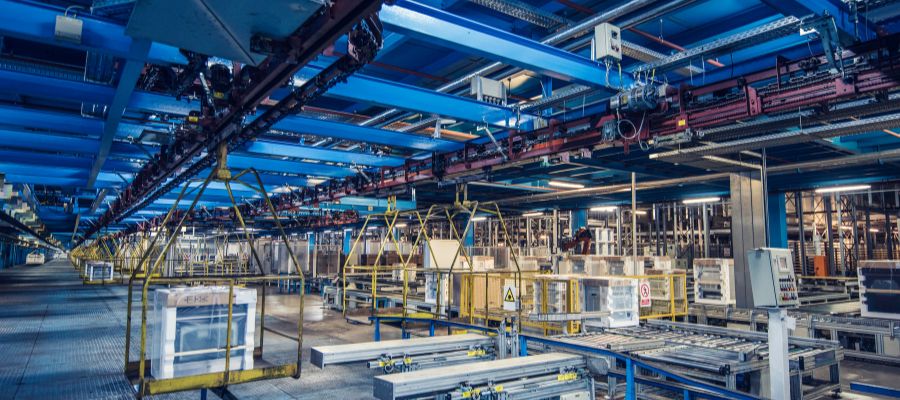How AI is Being Used in Manufacturing Today and For the Future

Artificial Intelligence (AI) is redefining industries across the globe, and manufacturing is no exception. From optimizing supply chains to enhancing product quality and predicting equipment failures, AI has become an essential tool for manufacturers aiming to stay competitive in today’s fast-evolving landscape. But the advancements we see today are only the beginning. The future of AI in manufacturing holds even more transformative potential, reshaping how products are designed, produced, and delivered.
How AI is Being Used in Manufacturing Today and For the Future
Predictive Maintenance
One of the most prominent applications of AI in manufacturing today is predictive maintenance. Manufacturing equipment is often complex and operates continuously, making downtime costly. AI helps manufacturers predict when machinery is likely to fail or require maintenance. By analyzing historical data from sensors embedded in machines, AI can identify patterns that indicate wear and tear, or potential failure points, and schedule maintenance before issues occur. This reduces unexpected breakdowns, cuts maintenance costs, and minimizes production delays.
Quality Control
Ensuring high product quality is essential in manufacturing, and AI is playing a key role in enhancing this aspect. Traditional quality control methods involve human inspection or basic automated systems, which can miss defects or inconsistencies. AI-driven computer vision systems can inspect products in real time, detecting even the most subtle defects that the human eye might miss. These systems improve the accuracy and speed of quality control processes, ensuring that products meet stringent standards.
For example, manufacturers of electronic components can use AI-powered visual inspection systems to identify microscopic defects in circuit boards that would otherwise go undetected. This reduces product recalls and enhances customer satisfaction.
Supply Chain Optimization
AI is revolutionizing supply chain management by providing real-time insights and automating decision-making processes. From demand forecasting to inventory management, AI can analyze vast amounts of data to optimize the supply chain. Machine learning algorithms help predict demand fluctuations, identify bottlenecks, and optimize delivery routes, ensuring that materials and products reach their destinations more efficiently.
In the automotive industry, AI-powered systems are used to manage complex global supply chains. By analyzing data on customer demand, production capacity, and transportation logistics, AI can adjust inventory levels dynamically, reducing the risk of overproduction or stockouts.
Robotics and Automation
Robotics have long been a part of manufacturing, but AI is making them smarter. AI-powered robots can now perform more complex tasks with greater precision, making them ideal for high-volume and high-precision industries like electronics and automotive manufacturing. Collaborative robots (cobots) equipped with AI can work alongside human operators, learning tasks through machine learning algorithms and adapting to new tasks with minimal programming.
These AI-enhanced robots are not only improving productivity but also making manufacturing environments safer by handling dangerous tasks or heavy lifting that could cause injury to human workers.
Generative Design
AI is also being used in the design phase of manufacturing through a process known as generative design. Engineers input design goals and constraints, such as materials, size, weight, and strength requirements, and AI algorithms generate multiple design options. These designs are often more efficient, innovative, and optimized for manufacturability than traditional human-designed products.
In aerospace manufacturing, AI-driven generative design has been used to create lightweight, strong components for aircraft, resulting in significant fuel savings and reduced emissions. As AI becomes more sophisticated, this technology will become even more integral to product design processes across industries.
The Future of AI in Manufacturing
While AI’s impact on manufacturing today is significant, the future holds even greater potential. Here’s how AI is expected to shape the future of manufacturing:
Autonomous Factories
The concept of fully autonomous factories, where AI systems control every aspect of production with minimal human intervention, is not far off. In the future, AI will be able to manage entire factories, from supply chain logistics to production lines. These smart factories will use AI to adjust production schedules in real-time, optimize energy usage, and ensure that machinery operates at peak efficiency.
For example, AI could monitor energy consumption throughout a factory, adjusting machine operation to reduce power use during peak hours. It could also automatically reorder supplies based on real-time inventory levels, ensuring that production never slows down due to lack of materials.
AI-Powered Workforce Collaboration
While AI will handle more of the repetitive and physically demanding tasks, human workers will still play a crucial role in manufacturing. In the future, AI will enhance human decision-making through advanced analytics, providing workers with real-time data and insights to make better decisions on the shop floor.
AI-powered wearable devices, such as smart glasses, could provide workers with instant information on machine performance or assembly instructions. Workers could collaborate with AI systems to troubleshoot issues or optimize production processes, creating a highly efficient human-AI workforce.
Custom Manufacturing at Scale
AI will enable manufacturers to offer custom products at scale. Traditionally, mass customization has been difficult and expensive due to the need for individualized production processes. However, AI-powered systems will be able to handle custom orders efficiently, adjusting production lines dynamically to accommodate specific customer requirements.
For instance, in the apparel industry, AI will allow manufacturers to create personalized clothing items based on customer preferences while maintaining the efficiency of mass production. This will open new opportunities for manufacturers to meet growing consumer demand for personalized products.
Sustainability and Environmental Impact
Sustainability is becoming increasingly important in manufacturing, and AI will play a key role in reducing the industry’s environmental footprint. AI can help manufacturers reduce waste, optimize energy consumption, and find alternative materials that are more eco-friendly. Machine learning algorithms will be able to analyze production processes and identify areas where energy usage or waste can be reduced.
In the future, manufacturers could use AI to minimize the carbon footprint of their supply chains by optimizing transportation routes, reducing excess inventory, and using AI-generated designs that require less material to produce.
Advanced Predictive Analytics
While predictive maintenance is a current use case for AI, future AI systems will provide even more advanced predictive capabilities. Instead of reacting to potential failures, AI will proactively identify areas for improvement before they become issues. AI will be able to simulate entire production lines, testing various scenarios and optimizing them for maximum efficiency.
This will allow manufacturers to stay ahead of potential disruptions, reduce downtime to near zero, and continuously improve their operations based on real-time data.
Conclusion
AI has already begun to revolutionize manufacturing by improving productivity, enhancing quality, and reducing operational costs. Today, predictive maintenance, quality control, supply chain optimization, and advanced robotics are just a few ways AI is transforming the industry. Looking to the future, AI promises even greater innovations, from fully autonomous factories to advanced predictive analytics and custom manufacturing at scale.
As AI technology continues to evolve, manufacturers who embrace these innovations will be well-positioned to thrive in an increasingly competitive global market. The future of manufacturing is intelligent, efficient, and sustainable, and AI is the driving force behind this transformation.
FAQs
What is predictive maintenance and how does AI support it?
Predictive maintenance uses AI to analyze machine data and forecast potential failures before they occur. Instead of relying on fixed schedules or reacting to breakdowns, manufacturers can service equipment exactly when needed. This minimizes downtime, extends machine life, and reduces maintenance costs. For example, AI can detect subtle changes in vibration, temperature, or pressure that indicate a component may fail soon, allowing companies to take action proactively.
How does AI improve quality control in manufacturing?
AI enhances quality control by using machine vision systems and advanced algorithms to inspect products for defects that human inspectors might miss. These systems can analyze images in real time, identifying inconsistencies such as cracks, misalignments, or material flaws. Manufacturers benefit from fewer defective products reaching customers, improved compliance with standards, and stronger customer satisfaction. AI also reduces reliance on manual inspection, lowering labor costs and improving efficiency.
How is AI being applied in supply chain optimization?
AI improves supply chain management by providing real-time visibility, demand forecasting, and intelligent decision-making. Machine learning models analyze historical data to predict demand, identify bottlenecks, and optimize delivery schedules. This enables manufacturers to reduce lead times, lower inventory costs, and respond more effectively to disruptions. In industries where supply chain complexity is high, AI provides the agility needed to remain competitive and resilient.
What role does AI play in robotics and automation?
AI makes robotics more adaptable and efficient by allowing machines to learn from data and adjust to changing conditions. Robots can now perform tasks such as assembly, packaging, or inspection with greater precision and flexibility. Collaborative robots (cobots), guided by AI, can safely work alongside humans, boosting productivity. By integrating AI into robotics, manufacturers can automate repetitive processes, reduce errors, and address labor shortages.
What is generative design and how does AI enable it?
Generative design uses AI algorithms to explore thousands of potential design solutions based on set criteria like strength, weight, or cost. Engineers input goals and constraints, and the AI generates optimized designs that humans may not have considered. This accelerates innovation and leads to lighter, stronger, and more efficient products. Industries such as aerospace, automotive, and industrial equipment are already using AI-driven generative design to create next-generation components.
What does the future of AI in manufacturing look like?
The future of AI in manufacturing includes autonomous factories, AI-powered workforce collaboration, custom manufacturing at scale, sustainability improvements, and advanced predictive analytics. Manufacturers will move toward factories that self-monitor and self-correct, employees will collaborate with AI systems in decision-making, and supply chains will become more dynamic and transparent. AI will also play a larger role in driving sustainable practices by optimizing energy use and reducing waste.
How can AI support sustainability in manufacturing?
AI contributes to sustainability by optimizing energy use, reducing waste, and improving resource efficiency. For example, AI can monitor energy consumption in real time and adjust production schedules to minimize costs and emissions. It can also identify inefficiencies in processes that contribute to waste. By embedding sustainability into daily operations, manufacturers can meet regulatory requirements, reduce costs, and strengthen their environmental reputation.
What are the benefits of AI-powered workforce collaboration?
AI helps workers by providing real-time insights, recommendations, and decision support. Instead of replacing human workers, AI complements their skills by handling repetitive or data-heavy tasks, allowing employees to focus on problem-solving and innovation. For example, AI tools can help schedulers optimize production runs or assist engineers in troubleshooting equipment failures. This partnership improves productivity, reduces stress, and enhances employee engagement.
How can manufacturers get started with AI adoption?
The best way to start is with targeted, high-value use cases such as predictive maintenance or AI-driven quality inspection. These areas deliver quick wins and measurable ROI. From there, manufacturers can expand into supply chain optimization, generative design, and broader digital transformation initiatives. Partnering with experienced technology providers like WM Synergy ensures that AI is aligned with business goals, integrated with ERP systems, and implemented in a way that drives both immediate and long-term value.


